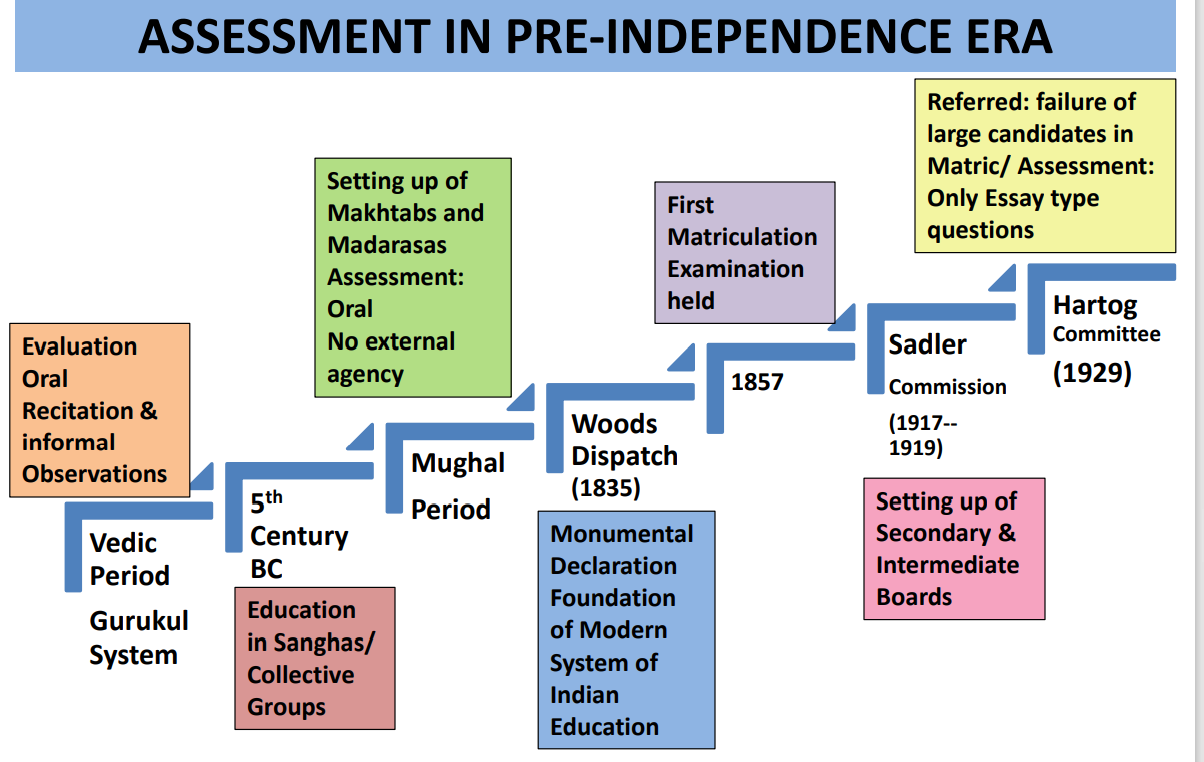The objective of educational reform is to fulfil the worldwide commitments made on the subject of education. When speaking of the educational reform, reference is often made to changes and transformations in the scholastic system in relation to such factors as educational philosophy, student policy, curriculum, pedagogy, didactics, organization, management, financing and links with national development in this century, the consensuses that the prime purpose of education is to care for and improve holistic education in early childhood, especially for the most vulnerable and underprivileged children, and to guarantee access to free, compulsory and high-quality education.
Within the field of education, reforms of education are undoubtedly one of the most complex and controversial subjects, because of the effects that they generate in the societies and countries where they take place. It is important to understand the object or intention of the educational reform, which normally focuses on certain common factors such as quality, access, equality of opportunity, finance, management, effectiveness, efficiency and competitiveness in the school systems of primary, secondary, tertiary and non-university education. If there is one thing to be reformed in education, it is the examination system. Over time India has moved from examination to evaluation and now to assessment.
The timeline of assessment practices in India from the Pre-independence era.
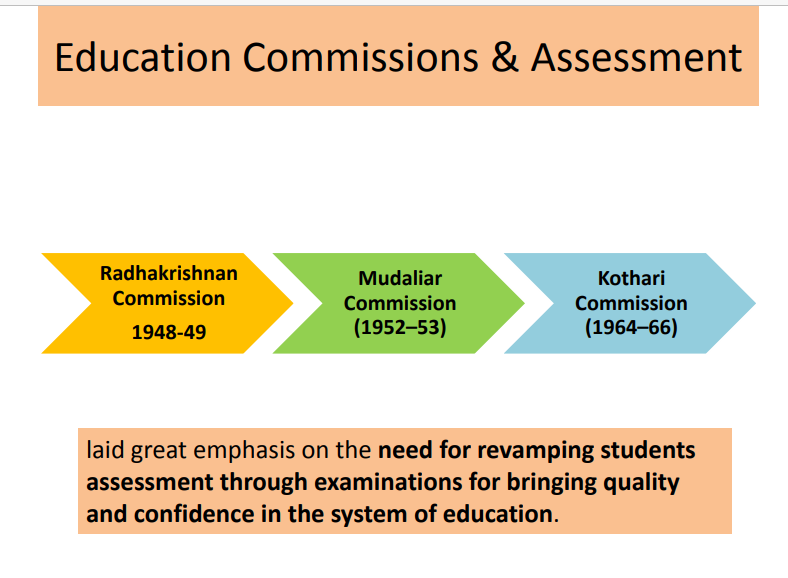 In terms of assessment, while National Policy on Education (NPE) 1968 recommended a shift in the focus of evaluation from certification to improvement in learning.
In terms of assessment, while National Policy on Education (NPE) 1968 recommended a shift in the focus of evaluation from certification to improvement in learning.
NPE 1986 suggested elimination of the excessive element of chance and subjectivity, de-emphasizing memorization, the introduction of Continuous and Comprehensive Evaluation (CCE), use of grades in place of marks and introduction of semester system from the second stage in a phased manner.
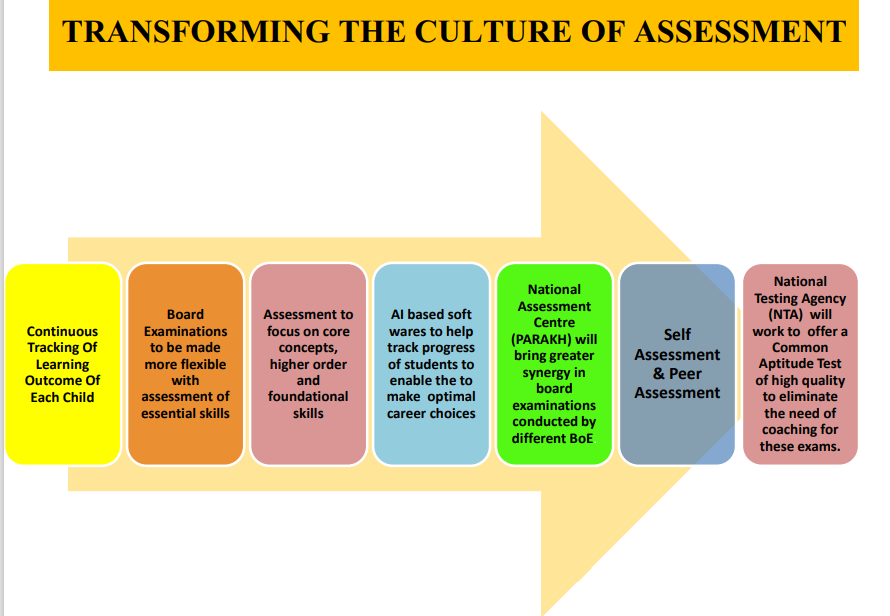 Today, the New Education Policy 2020 (NEP-2020) emphasizes transforming assessment for optimizing the learning and development of all students. NEP-2020 focuses on – regular, formative and competency-based assessment, promoting learning and development of students and testing higher-order skills (analysis, critical thinking and conceptual clarity etc.). The goal of NEP-2020 is to transform the culture of assessment. There is a provision in NEP-2020 regarding support for Gifted Students. MOE reiterated by calling on all stakeholders to work together for the successful implementation of NEP-2020 to fulfil the aspirations of 260 million students, their parents, teachers and the school system.
Today, the New Education Policy 2020 (NEP-2020) emphasizes transforming assessment for optimizing the learning and development of all students. NEP-2020 focuses on – regular, formative and competency-based assessment, promoting learning and development of students and testing higher-order skills (analysis, critical thinking and conceptual clarity etc.). The goal of NEP-2020 is to transform the culture of assessment. There is a provision in NEP-2020 regarding support for Gifted Students. MOE reiterated by calling on all stakeholders to work together for the successful implementation of NEP-2020 to fulfil the aspirations of 260 million students, their parents, teachers and the school system.
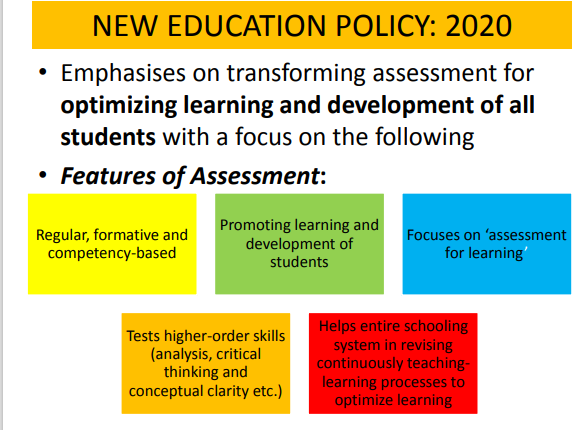 With the objective to provide equitable and inclusive high-quality education to all. We have to prepare students for the changing employment landscape and global ecosystem. We have to reform the education system towards real understanding and learning how to learn away from the culture of rote learning. The main aim for students has become getting good marks. The society too gives preferential treatment to those who attain high marks. It is high time that the main aim of examination should shift towards the all-round development of students. We should focus on holistic development which includes cognitive development and building character and creating well-rounded individuals equipped with key 21st-century skills and we should focus on experiential learning.
With the objective to provide equitable and inclusive high-quality education to all. We have to prepare students for the changing employment landscape and global ecosystem. We have to reform the education system towards real understanding and learning how to learn away from the culture of rote learning. The main aim for students has become getting good marks. The society too gives preferential treatment to those who attain high marks. It is high time that the main aim of examination should shift towards the all-round development of students. We should focus on holistic development which includes cognitive development and building character and creating well-rounded individuals equipped with key 21st-century skills and we should focus on experiential learning.
Progress report card to be holistic which gives 360, multidimensional report that reflects the progress as well as the uniqueness of each learner in the cognitive, affective and psychomotor domains. Another point about report card that they should include self-assessment, peer assessment and teacher assessment. Artificial Intelligence-based software can be done to help students track their growth, strengths and weaknesses, area of interest and thereby make optimal career choices.
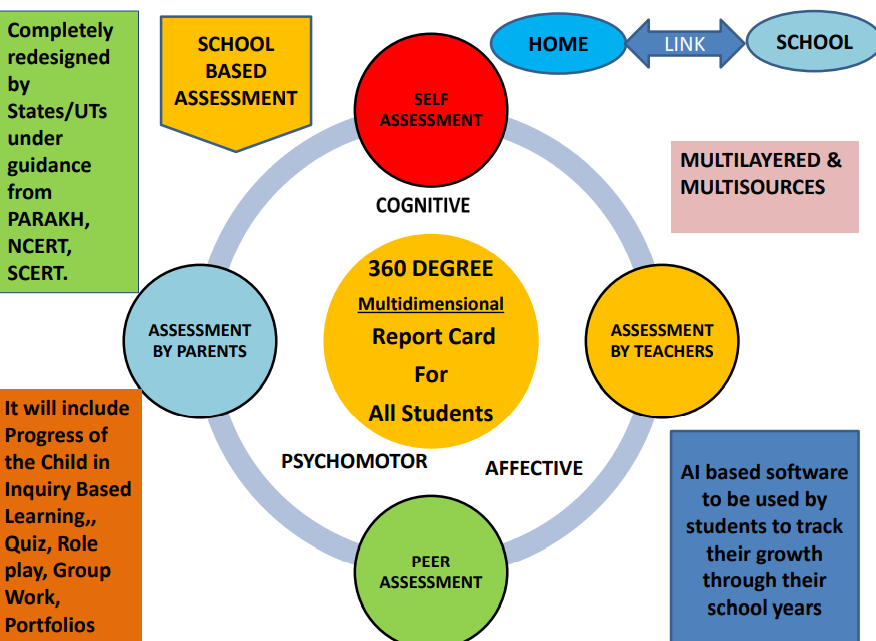 CBSE has changed the pattern where Internal Assessment is conducted in all subjects and given due weightage of 20% in the final examination to distribute the burden. It has also incorporated different sets of questions such as objective type questions (MCQs and other types), source-based and case-based questions etc. to focus on higher-level competencies beyond recall and understanding. Moreover, CBSE has started two levels of Mathematics Examination –Basic and Standard in 10th class to cater to different kinds of learners and reduce overall student stress levels. A similar model will be replicated in the 12th class as well.
CBSE has changed the pattern where Internal Assessment is conducted in all subjects and given due weightage of 20% in the final examination to distribute the burden. It has also incorporated different sets of questions such as objective type questions (MCQs and other types), source-based and case-based questions etc. to focus on higher-level competencies beyond recall and understanding. Moreover, CBSE has started two levels of Mathematics Examination –Basic and Standard in 10th class to cater to different kinds of learners and reduce overall student stress levels. A similar model will be replicated in the 12th class as well.
Reforming Examinations From Grade 9 To 12 Including Board Examinations
The secondary exams, board exams and entrance exams are eating away valuable time for true learning with excessive exam-coaching and exam preparation. These exams also force students to learn a very narrow band of content in a single stream. Board exams are redesigned to encourage holistic development by way of discouraging coaching culture and exam preparation. Students are given the freedom to choose a range of subjects in which they take Board exams, depending on their individualized interests. Board exams are made ‘easier in the sense that they test primarily core capacities/ competencies rather than content memorization. All students are allowed to take Board exams on up to two occasions during any given school year, one main examination and one for improvement to eliminate the ‘high stakes’ aspect of Board exams. There will no more concept of compartment exams.
Visible Model to be explored annual/semester/modular exams, two parts exams (objective and descriptive Guidelines will be prepared by NCERT, in consultation with SCERTS, BoEs & PARAKH Teachers to be prepared for a transformation in the assessment by 2022-23 academic session.
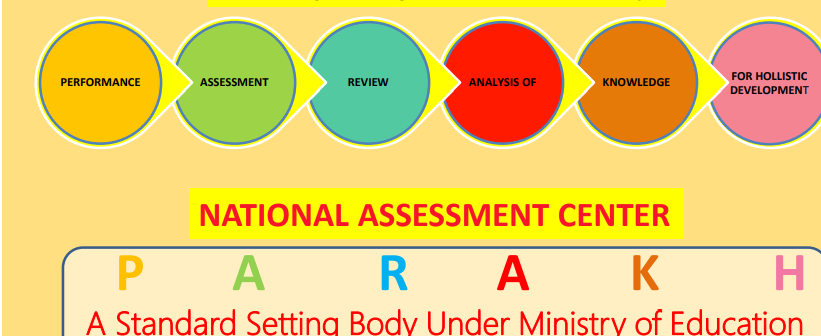 Examinations From Grade 1 to 8
Examinations From Grade 1 to 8
Key Stage Assessments in Grades 3, 5 and 8 to track achievement. Achievement of Critical Learning Outcomes. Testing to focus on the achievement of essential learning outcomes. Moving away from rote learning. Assessments of core concepts and knowledge, higher-order skills and their application in real-life situations. Results of School examinations to be used only for developmental purposes and for continuous monitoring and improvement of the schooling system.
Role of Teachers/ Career Counsellors in Changing Times
Senior teachers should have the expertise for career counselling as they are in constant interaction with students and they are more comfortable discussing their careers with class teachers/subject teacher. The role of teachers to bring awareness about emerging careers and changing trends in the field of education helps students in decision making. The role of teachers and career counsellors is paramount during stream selection or subject selection. If selection is done judiciously keeping in mind the strengths, weakness, interest and aptitude, then chances of failure and discontent are reduced drastically. Nowadays you are spoilt for choices and there is an overflow of information everywhere which makes it very difficult to identify the key skills and aptitude. Hence the job of a counsellor becomes more crucial. They suggest psychometric tests like the Ideal career test and branch selector test which helps to make an informed decision about a career. As they customise the best-suited career options based upon the chosen subjects.
CBSE’s New Assessment System for Class 10 Students
The basic break-up of marks provided by the board is as follows: 20 marks based on Internal Assessment which has already been conducted by most schools with marks already uploaded, 10 marks for Periodic/Unit Test, 30 for Half Yearly/Mid-Term Examinations, and 40 marks for Pre-Board Examinations. The board has prescribed a system of internal moderation by all schools based on the historical performance of a school, taking the best performance in the last three years’ board examinations as the ‘reference year’.
CBSE’s New Assessment System (Proposed) for Class 12 Students – Blended Model
The basic break-up of marks provided by the board is as follows: 30% weightage to grade 10, 30% weightage to Class XI and the rest 40% weightage to grade 12. For class XII, the marks obtained in a unit, term, and practical exams will be taken into account. Historical performance of a school in class XII board for last few years and the overall percentage of marks obtained by students in past years board examinations will be taken into account for moderation purpose.
Keeping in mind the unprecedented times and the unpredictable situation there cannot be an ideal solution that satisfies all stakeholders but an optimal solution is proposed. This is all about the reformation of education policy and assessment policy. And also how career counsellors play a major role in it.
If you are passionate about guiding students on making the right career choices, kick start your career with the Global Career Counsellor Program. This is a first of its kind career counselling program that helps individuals to become a professional career counsellor. Become a Global Career Counsellor to upskill your counselling services.

Anjali Drolia
This is Ms. Anjali Drolia, Senior Educationist, Teacher and trained Global Career Counsellor. Anjali has more than 16 years of teaching experience. When she was working as a teacher, she realized the need for guiding students on the right career path.
She noticed many students confused about their career decisions. Then she took the responsibility of guiding students and started helping them understand their strengths, interests, likes and dislikes. According to the personalities, interests, and other aspects of the students, she suggests them the right career direction.


